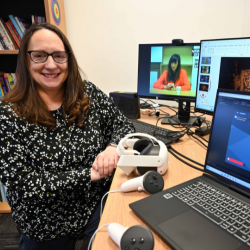-
Study
-
Quick Links
- Course Search
- Fees and Funding
- Unlock Your Potential
- Still time to Apply
- Higher and Degree Apprenticeships
- Continuing Professional Development
- Still time to apply
-
Undergraduate
- Application Guides
- UCAS Exhibitions
- Foundation Years
- School & College Outreach
- Information for Parents
-
Postgraduate
- Application Guide
- Postgraduate Research Degrees
- Flexible Learning
- Change Direction
- Register your Interest
-
-
International
International
Northumbria’s global footprint touches every continent across the world, through our global partnerships across 17 institutions in 10 countries, to our 277,000 strong alumni community and 150 recruitment partners – we prepare our students for the challenges of tomorrow. Discover more about how to join Northumbria’s global family or our partnerships.
View our Global Footprint-
Quick Links
- Course Search
- Undergraduate Study
- Postgraduate Study
- Information for Parents
- London Campus
- Northumbria Pathway
- Cost of Living
- Sign up for Information
-
International Students
- Information for Students
- International Events
- Application Guide
- Entry Requirements and Education Country Agents
- Global Offices
- English Requirements
- English Language Centre
- International student support
- Cost of Living
-
International Fees and Funding
- International Undergraduate Fees
- International Undergraduate Funding
- International Masters Fees
- International Masters Funding
- International Postgraduate Research Fees
- International Postgraduate Research Funding
-
International Partners
- Agent and Representatives Network
- Global Partnerships
- Global Community
-
International Mobility
- Information for Northumbria Students
- Information for Incoming Exchange Students
-
-
Business
Business
The world is changing faster than ever before. The future is there to be won by organisations who find ways to turn today's possibilities into tomorrows competitive edge. In a connected world, collaboration can be the key to success.
More on our Business Services -
Research
Research
Northumbria is a research-rich, business-focused, professional university with a global reputation for academic quality. We conduct ground-breaking research that is responsive to the science & technology, health & well being, economic and social and arts & cultural needs for the communities
Discover more about our Research -
About Us
-
About Northumbria
- Our Strategy
- Our Staff
- Place and Partnerships
- Leadership & Governance
- Academic Departments
- University Services
- History of Northumbria
- Contact us
- Online Shop
-
-
Alumni
Alumni
Northumbria University is renowned for the calibre of its business-ready graduates. Our alumni network has over 246,000 graduates based in 178 countries worldwide in a range of sectors, our alumni are making a real impact on the world.
Our Alumni - Work For Us
What will I learn on this module?
In this module you with explore how graphic design can have a measurable impact on communities and the wider world by contributing to positive social change. Working as a team with a given brief, you will demonstrate an understanding of the topic and a justification for your design response by using appropriate levels of creativity, empathy and respect, demonstrated through your subject immersion, design research, and working journal.
You will further develop your working skills and understanding through intellectually exploring and navigating the creative process from start to finish, with particular focus given to the relationship between the key areas of immersion, design research and ideation, development and iteration, and refinement and finishing.
You will explore and develop your knowledge, working practices and understanding of graphic design through the application of appropriate design processes and methodologies. During the module you will be presented with social challenges and will apply design thinking to navigate and broaden your understanding of how graphic design impacts societally, politically and ethically. You will understand how design experiences can drive individual actions, and how and why they can implement change.
How will I learn on this module?
In this is creative practice module, you will develop teamworking strategies alongside your evolving practical design process to help manage your creativity.
You will learn through a series of activities including lectures, workshops, studio-based critiques and peer-learning, and group and one-to-one tutorials. You will be responsible for organising your workload and driving the project forward. This structure will challenge thinking around process and practice whilst opening new, authentic and efficient ways to operate as a designer.
You will be supported through the module by technical staff who will provide specific intermediate support in:
Technical demonstration and support in the Adobe Creative Cloud tools depending on the needs of the module brief. (This could include InDesign, Photoshop, Illustrator, Acrobat, Dimensions, Firefly, Premier Pro, After Effects, XD as well as other 2-D and 3-D visualisation software and techniques)
Access and support to making, finishing, prototyping, model making, book binding, physical 3-D visualisation techniques and finishes.
Studio Photography, lighting, creative techniques and image creation.
Technical staff will provide specialist workshops and on-going consultancy support throughout the module. You will also have access to the technical resource centre who can loan you any specialist equipment needed for your project outcome.
You will continue to develop a professional and intellectual understanding of your role as a graphic designer through the experience of creation, reflection, presentation, and the use of the design process, mirroring contemporary industry practice.
How will I be supported academically on this module?
Support and feedback will be provided throughout the module.
Staff contact
Module tutors will provide academic support.
Informal staff-student critiques will help you to discuss, understand, develop and inform design project specifics in a collaborative way.
Formal group critiques, mirroring industry practice allow for detailed project critique, evaluation and feedback on the development of the creative responses.
Project requirements are normally introduced via a briefing session, where the module will be fully explained.
Blackboard will be used to communicate all relevant module information, updates or modifications.
Studio contact time
Delivery is through a blend of lectures, studio-based critiques, practical demonstrations and independent learning.
Studio Culture is an important aspect of your development. It also mirrors industry practice.
Independent study hours should be utilised to continue the development and progression of your studio-based practice.
Peer and independent support
Studio culture and independent study also supports personal development and fosters an appreciation and evaluation of your own and your peer’s working practices.
What will I be expected to read on this module?
All modules at Northumbria include a range of reading materials that students are expected to engage with. The reading list for this module can be found at: http://readinglists.northumbria.ac.uk
(Reading List service online guide for academic staff this containing contact details for the Reading List team – http://library.northumbria.ac.uk/readinglists)
What will I be expected to achieve?
Knowledge & Understanding (KU):
Demonstrate ability to use cultural knowledge and conceptual insights to analyse issues of responsibility, sustainability, and ethics in the realisation of effective graphic design outcomes positively impacting social change. (KU 1,2)
Intellectual/Professional Skills & Abilities (IPSA):
Demonstrate proficient use of intellectual and technical creativity through analysing and communicating graphic design concepts realising positive social change. (IPSA 1)
Show knowledgeable integration of multiple perspectives in the experimentation and development of creative ideas and concepts. (IPSA 2,3,4)
Personal Value Attributes (PVA):
Demonstrate in-depth appreciation and competent use of craft and technical skills through continual reflection and refinement. (PVA 1,2)
Evaluate self-directed project management skills to an intermediate level, both aesthetically and conceptually. (PVA 2,4)
How will I be assessed?
You will be assessed against a creative response to a set brief with consideration given to the creative processes deployed and evidenced and against the module learning outcomes.
The assessment and feedback strategy is;
a. Formative assessment
You will receive verbal formative feedback both individually and in groups throughout the module. This feedback will facilitate the development of your assignment. This feedback will allow you to reflect upon your own work and act upon feedback prior to final submission.
b. Summative assessment
The project brief driving the module will identify the
assessment ask and criteria including submission requirements (deliverables) appropriate to the topic of the project.
You will generate throughout your project a physical document we call a Working Journal. This documents your creative journey, understanding and authorship of the creative response. It also demonstrates the originality and provenance of your work, as well as your understanding, through the appropriate application of processes, methodologies and technical/craft skills developed throughout the module.
Final project submission will be as a physical portfolio of work. You may also be asked to complete some form of self-reflection as part of the submission, this could take the form of a written or video rationale/reflection. Whilst this component is not assessed as a deliverable, it may serve to support or inform Personal Values Attributes.
This module is exempt from the Anonymous Marking Policy. The nature of working closely and directly with the student in class makes anonymity impractical.
As you move through the programme, the emphasis on attaining a higher level of engagement in each of the learning outcomes will also adapt to reflect your subject advancement to focus on the production of highly sophisticated and professional levels of proficiency in thinking and making.
Pre-requisite(s)
N/A
Co-requisite(s)
N/A
Module abstract
Graphic Design for Social Change allows you to understand what Graphic Design can do, and be, in making change in the community and wider world.
You will explore and develop your knowledge and working practices through the application of graphic design processes and methodologies. The module fosters an understanding and appreciation of the creative graphic design process while allowing you to explore, consider and reflect on your ethical position and responsibilities as a contemporary graphic designer.
You with explore how graphic design can have a measurable impact on communities and the wider world by contributing to social change.
You will demonstrate an understanding of the given topic and a justification for your design response by using appropriate levels of creativity, empathy, and respect demonstrated through your subject immersion and working journal.
You will explore and develop your knowledge, working practices and understanding of graphic design through the application of appropriate design processes and methodologies. During the module you will be presented with social challenges and will apply graphic design thinking to navigate and broaden your understanding of how graphic design can impact societally, politically and ethically. You will understand how design experiences can drive individual actions, and how and why it can support meaningful change.
Course info
UCAS Code W215
Credits 20
Level of Study Undergraduate
Mode of Study 3 years Full Time or 4 years with a placement (sandwich)/study abroad
Department Northumbria School of Design, Arts and Creative Industries, Northumbria School of Design
Location City Campus, Northumbria University
City Newcastle
Start September 2025 or September 2026
All information is accurate at the time of sharing.
Full time Courses are primarily delivered via on-campus face to face learning but could include elements of online learning. Most courses run as planned and as promoted on our website and via our marketing materials, but if there are any substantial changes (as determined by the Competition and Markets Authority) to a course or there is the potential that course may be withdrawn, we will notify all affected applicants as soon as possible with advice and guidance regarding their options. It is also important to be aware that optional modules listed on course pages may be subject to change depending on uptake numbers each year.
Contact time is subject to increase or decrease in line with possible restrictions imposed by the government or the University in the interest of maintaining the health and safety and wellbeing of students, staff, and visitors if this is deemed necessary in future.
Useful Links
Find out about our distinctive approach at
www.northumbria.ac.uk/exp
Admissions Terms and Conditions
northumbria.ac.uk/terms
Fees and Funding
northumbria.ac.uk/fees
Admissions Policy
northumbria.ac.uk/adpolicy
Admissions Complaints Policy
northumbria.ac.uk/complaints








